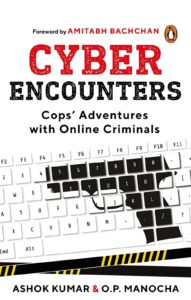
 By Kaushal Kishore*
By Kaushal Kishore*
The number of reported cybercrimes in India reached around a couple of million last year. That means an average of more than 5,000 online offences per day. The number of unreported cyber crimes in India and other parts of the world is yet another issue. Today, the global annual estimate of cyber fraud is worth a trillion US dollars.
The pioneer of Artificial Intelligence (AI) and Nobel laureate for computing, Geoffrey Hinton, has started regretting his achievement. Recently, he resigned from Alphabet Inc., the mother institution of Google, after a decade-long service, to speak freely about the risks of AI.
 Just before Hinton’s resignation, in the third week of April 2023, ever-rising cybercrimes were discussed at the Indian Institute of Technology (IIT) Delhi auditorium. This was a part of the dialogue series based on the book, Cyber Encounters, that IIT alumnus and Director General of Uttarakhand Police, Ashok Kumar, wrote with Om Prakash Manocha, a retired scientist of the DRDO (Defence Research and Development Organisation).
Just before Hinton’s resignation, in the third week of April 2023, ever-rising cybercrimes were discussed at the Indian Institute of Technology (IIT) Delhi auditorium. This was a part of the dialogue series based on the book, Cyber Encounters, that IIT alumnus and Director General of Uttarakhand Police, Ashok Kumar, wrote with Om Prakash Manocha, a retired scientist of the DRDO (Defence Research and Development Organisation).
In this literary work, the adventures of the police with cyber criminals are described in detail. The 12 cases deal with the online offences that the police have solved in the last 15 years. It can help readers understand the tactics and the modus operandi of the criminals, in addition to the psychology of their victims, in cases of cyber crimes.
The technology, better known as AI, helped the crooks commit these cybercrimes. The number of such crimes has been increasing. The evolution of ultra-modern technology claims to solve growing problems, but in the process, it has created an unprecedented series of crises. There are questions about this model of development. It needs serious attention before it wipes out our values.
The top chatbots of AI like ChatGPT, Bard and Bing are part of the public discourse these days. The advent of 5G is going to improve the ‘Internet of Things‘ to further the scope of cyber crimes. Today, the law is inefficient and law enforcement agencies are deficient in comparison to the ultra-modern tool kits available in the hands of cybercriminals. In case the state has failed to improve itself, it cannot address the dangers that humanity is bound to face in the future.
Geoffrey Hinton was ready with an excuse. He said, “I console myself with the normal excuse: If I had not done it, somebody else would have.” The very same idea resonates when Kumar and Manocha referred to the 19th-century French author and politician Victor Hugo, who once said, “No force can stop an idea whose time has come.” Although the intentions of the three leaders are centred on the improvement of the state of affairs in cases of AI and cybercrimes, it’s not going to save innocent victims.
The investigation of cybercrimes is entirely different from the usual business of law enforcement agencies. It deals with a complicated cobweb — very difficult to expose. As such, this is also referred to as the dark web. The highly skilled officers of the police force have displayed a quality of work worth noticing. But this is tiny in comparison with the large number of cybercrimes.
The Uttarakhand Police solved the first cyber crime case in 2007. Its victim reported winning the online British lottery worth Rs 19.5 million when she lost a couple of million to obtain the prize money. Greed had led her to commit theft as well. In the mid-1990s, an email-based lottery scam started in African countries, such as Nigeria and Cameroon. Now more than tens of millions of such emails are generated every day. Most of the time, the recipients are declared the winner without taking part in any lottery scheme. The victims’ greed and ambition to be rich quickly is the key to the success of the fraudsters in most such cases. The Uttarakhand Police claims to have solved this case perfectly.
During the Covid-19 pandemic, the police unearthed the Ponzi fraud better known as the PowerBank app. The Uttarakhand Police helped other states like Gujarat, Maharashtra, Karnataka, Delhi and Telangana to expose scams worth Rs 2,700 crore and solve 350 cases of economic fraud committed online.
A network of criminals launched the app only to promote easy loans and money-doubling schemes to trap the victims. The involvement of shell companies, exchanges of crypto-currency and thereby feeding the Chinese coffer was what the law enforcement agencies addressed in this chain of cases. This is a serious threat that India needs to address sincerely in the future as well.
The second human fault is addressed in two different cases. Honey trap and sextortion were other successful cases that they solved. In fact, the weakness of the individual played a primary role in such cases. The effects of technology are meaningless in absence of the lustful desires or companionship. Next to greed, cyber offenders preferred to cash in on this kind of human weakness.
The police exposed an ATM cloning scam in 2017. It has helped banks improve the security features of the card — chip-based new plastic cards are one of its outcomes. All the victims were innocent customers of the banks without committing any wrong. As such, the court has directed the banks to reimburse their lost money, in case it was reported on time.
The book deals with yet another cyber fraud that was committed by bank staff. The police exposed it in addition to the innocence of the victim. It was unbelievable to learn that the widow of a security officer had paid Rs 6.6 million for a dog claimed to be worth Rs 15,000 only. The cybercriminals were running the call centre to commit such an economic offence. One such group was cheating elderly American citizens while operating from places like Noida and Dehradun. They introduced new terms like ransomware and malware into the lexicon.
To dupe pilgrims visiting a shrine is an old trade. Its new version is a call centre-based cybercrime. Police solved a cheating case when a group of pilgrims paid for a helicopter ride to visit Kedarnath. They exposed a series of call centres running from places like Jamtara in Jharkhand, Mewat in Haryana and Bharatpur in Rajasthan.
Undoubtedly, the next war will be fought in cyberspace. Today, the world is trying hard to prepare for such warfare. The leaders of the 21st century need to think about those ideas that can save humanity from the clutches of this civilisation based on ultra-modern technology.
On a different occasion, in the same IIT auditorium, former CBI director Joginder Singh tried to address this crisis. He said that the value of Dharma (eternal law) is now replaced with Dhan (money), and human civilisation needs to restore the previous order. The modern era of technology needs to revisit the old age of tools.
*Author of The Holy Ganga (Rupa 2008) and Honourary Secretary, Srishti Sustainable Development Foundation.




